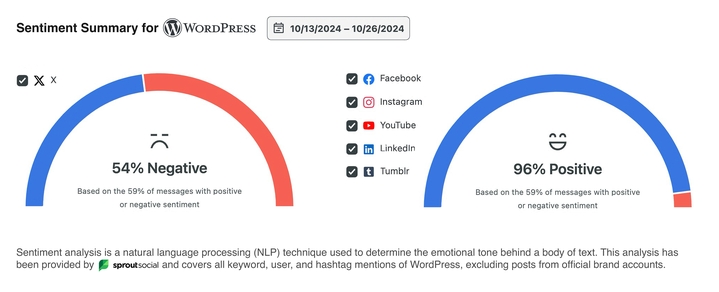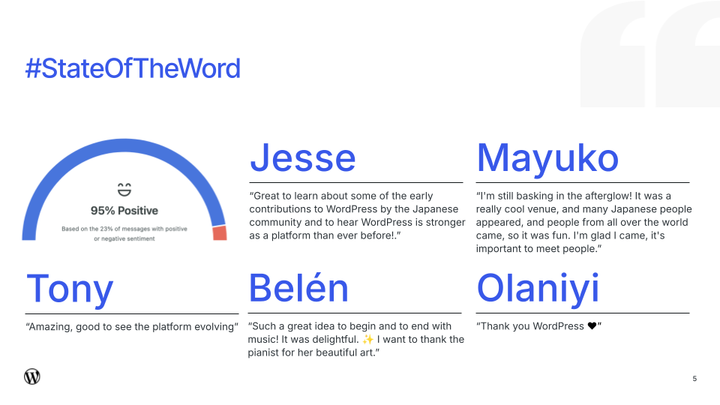On X last October, WordPress seemed to be in crisis. The high-profile lawsuit between WP Engine and Automattic, coupled with criticism of Matt Mullenweg’s leadership, sparked heated debates. But outside of the platform formerly known as Twitter, the data tells a different story: WordPress sentiment remained overwhelmingly positive.
WordPress sentiment has held steady at around 80% positive—fluctuating within a 2-point margin—since Nicholas Garofalo, Director of Marketing for WordPress.org, began tracking it three years ago. While negativity on X hit an all-time high of 54% last October, sentiment on other social platforms, including Facebook, LinkedIn, Instagram, YouTube, and Tumblr, remained largely unaffected, holding at 96% positive.
“Even when X is on fire, the majority of the WordPress community elsewhere often remains positive,” Garofalo told The Repository.

By January, sentiment on X had rebounded to 82%, Garofalo said. Across all platforms he tracks—X, Facebook, Instagram, YouTube, LinkedIn, Reddit, Tumblr, and the web—sentiment remained consistent at 80% positive.
Garofalo said the results might surprise those who spend most of their time engaging with the WordPress community on X, a platform where algorithm-driven engagement tends to amplify negativity, favoring reactionary and polarizing discussions. He noted that WordPress.org’s total social following across all platforms had grown to 2.3 million over the past three years, becoming more diverse in the process.
“An intentional move on our part — X has historically been male-dominated and US-based,” he explained.
Garofalo and Brett McSherry, Digital Marketing Manager at Automattic, use Sprout Social, a social media management tool, to track WordPress and Gutenberg sentiment. Garofalo clarified that their sentiment tracking omits content from official WordPress and Automattic accounts to avoid artificially inflating positivity. Sprout Social pulls sentiment data from social media, review sites, news articles, podcasts, and other sources.
That said, sentiment on X last October wasn’t just shaped by community debates—it was also impacted by the official WordPress.org account’s own posts.
Amid escalating tensions between WordPress co-founder Matt Mullenweg and hosting company WP Engine, the account was criticised for its antagonistic tone. Community members on Reddit and Post Status Slack called out the account for “trolling” users. In one now-deleted post, it mocked a contributor’s work as “masturbatory.” In another, it dismissed a critic with a curt, “Sorry, who are you?” Many saw the tone as highly unprofessional for a platform that powers a significant portion of the web.
When asked how he reconciled the overwhelmingly positive sentiment data with the frustrations felt by many in the WordPress community about governance and Gutenberg—particularly in Post Status Slack—Garofalo acknowledged that the sentiment data drew from a wider audience beyond the people who contribute to and work closely with the WordPress project.
“Regarding governance, you can use and build with WordPress without knowing how it’s made or governed. So the sentiment measured here is really about the end result of all the work that goes into the project,” he said.
“As for Gutenberg, I think change is hard. The sentiment score for ‘Gutenberg’ is at 79% positive (we have it configured as a theme option in Sprout), and we should remember that many users have never even heard of Gutenberg—they just happily use the block editor. The project philosophy is to design for the majority, and all the data seems to indicate that’s what’s happening.”
Garofalo also pointed to the gutenstats.blog website, which Mullenweg recently shared on X. As this post was published, the site shows that the Gutenberg plugin has 85.7 million active installations and that 252.6 million posts have been written using it.
Events drive positive sentiment
Strong sentiment around WordPress events has shaped WordPress.org’s social strategy.
“When we start drilling down into specifics like events, sentiment is especially good, often surpassing the average sentiment for WordPress,” Garofalo said.
In the days following the State of the Word on December 16, 2024, in Tokyo, Japan, sentiment across all platforms spiked at 95% positive.

Garofalo said past positive sentiment data following events had led his team to work more closely with event organizers, boosting event coverage on social media and expanding livestreaming. In 2024, all four flagship events—WordCamp Asia, WordCamp Europe, WordCamp US, and State of the Word—were livestreamed, making them more accessible to a global audience in real time.
No major social shifts—except possibly Bluesky
Despite the negativity on X, Garofalo said he had no plans to significantly alter WordPress.org’s social strategy.
“We aim for a certain level of parity across the platforms we support since we want WordPressers to have equal access to information regardless of the social platform they choose to spend time on,” he said.
That said, expansion to Bluesky is under consideration—not due to sentiment concerns, but because of X’s shrinking user base.
“We are looking to expand to other platforms, like Bluesky, once we sort out the technical details, but that has more to do with the exodus of users from X than it does sentiment,” he said.
Mullenweg recently referenced Garofalo’s sentiment analysis on The Logan Bartlett Show, also noting that X’s algorithm amplifies negativity.
“I’ve been pretty good about not being too much on Twitter in previous years, but with all the AI stuff, there’s so much cool AI stuff that happens there,” Mullenweg told Bartlett. “So I kind of go there for that, but then sometimes I get sucked into replying to someone.”









Comments
One response to “WordPress Sentiment Defies X Drama, Remains Strong Across Platforms”
It’s impressive that the approval rating is that high, considering all the recent drama. Every time I see something about WordPress, it’s bad news.